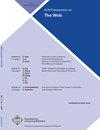Enhancing Conversational Recommendation Systems with Representation Fusion
IF 4.1
4区 计算机科学
Q2 COMPUTER SCIENCE, INFORMATION SYSTEMS
引用次数: 0
Abstract
Conversational Recommendation Systems (CRSs) aim to improve recommendation performance by utilizing information from a conversation session. A CRS first constructs questions and then asks users for their feedback in each conversation session to refine better recommendation lists to users. The key design of CRS is to construct proper questions and obtain users’ feedback in response to these questions so as to effectively capture user preferences. Many CRS works have been proposed; however, they suffer from defects when constructing questions for users to answer: (1) employing a dialogue policy agent for constructing questions is one of the most common choices in CRS, but it needs to be trained with a huge corpus, and (2) it is not appropriate that constructing questions from a single policy (e.g., a CRS only selects attributes that the user has interacted with) for all users with different preferences. To address these defects, we propose a novel CRS model, namely a Representation Fusion–based Conversational Recommendation model, where the whole conversation session is divided into two subsessions (i.e., Local Question Search subsession and Global Question Search subsession) and two different question search methods are proposed to construct questions in the corresponding subsessions without employing policy agents. In particular, in the Local Question Search subsession we adopt a novel graph mining method to find questions, where the paths in the graph between users and attributes can eliminate irrelevant attributes; in the Global Question Search subsession we propose to initialize user preference on items with the user and all item historical rating records and construct questions based on user’s preference. Then, we update the embeddings independently over the two subsessions according to user’s feedback and fuse the final embeddings from the two subsessions for the recommendation. Experiments on three real-world recommendation datasets demonstrate that our proposed method outperforms five state-of-the-art baselines.用表示融合增强会话推荐系统
会话推荐系统(CRS)旨在通过利用会话中的信息来提高推荐性能。CRS首先构建问题,然后在每次会话中询问用户的反馈,以完善向用户提供的更好的推荐列表。CRS的关键设计是构建适当的问题,并获得用户对这些问题的反馈,从而有效地捕捉用户的偏好。已经提出了许多CRS工作;然而,它们在构建问题供用户回答时存在缺陷:(1)使用对话策略代理来构建问题是CRS中最常见的选择之一,但它需要用庞大的语料库来训练,以及(2)对于具有不同偏好的所有用户,从单个策略(例如CRS仅选择用户已经交互的属性)构建问题是不合适的。为了解决这些缺陷,我们提出了一种新的CRS模型,即基于表示融合的会话推荐模型,其中整个会话被划分为两个子会话(即局部问题搜索子会话和全局问题搜索子任务),并且提出了两种不同的问题搜索方法来在不使用策略代理的情况下在相应的子会话中构造问题。特别是,在局部问题搜索子会话中,我们采用了一种新颖的图挖掘方法来查找问题,其中图中用户和属性之间的路径可以消除不相关的属性;在“全局问题搜索”子部分中,我们建议使用用户和所有项目历史评级记录初始化用户对项目的偏好,并根据用户的偏好构建问题。然后,我们根据用户的反馈在两个子会话上独立地更新嵌入,并融合来自两个子会话的最终嵌入以进行推荐。在三个真实世界的推荐数据集上的实验表明,我们提出的方法优于五个最先进的基线。
本文章由计算机程序翻译,如有差异,请以英文原文为准。
求助全文
约1分钟内获得全文
求助全文
来源期刊

ACM Transactions on the Web
工程技术-计算机:软件工程
CiteScore
4.90
自引率
0.00%
发文量
26
审稿时长
7.5 months
期刊介绍:
Transactions on the Web (TWEB) is a journal publishing refereed articles reporting the results of research on Web content, applications, use, and related enabling technologies. Topics in the scope of TWEB include but are not limited to the following: Browsers and Web Interfaces; Electronic Commerce; Electronic Publishing; Hypertext and Hypermedia; Semantic Web; Web Engineering; Web Services; and Service-Oriented Computing XML.
In addition, papers addressing the intersection of the following broader technologies with the Web are also in scope: Accessibility; Business Services Education; Knowledge Management and Representation; Mobility and pervasive computing; Performance and scalability; Recommender systems; Searching, Indexing, Classification, Retrieval and Querying, Data Mining and Analysis; Security and Privacy; and User Interfaces.
Papers discussing specific Web technologies, applications, content generation and management and use are within scope. Also, papers describing novel applications of the web as well as papers on the underlying technologies are welcome.
 求助内容:
求助内容: 应助结果提醒方式:
应助结果提醒方式:


